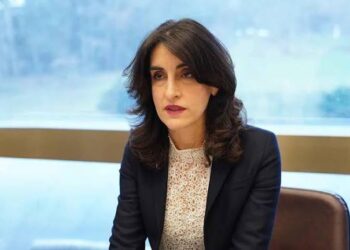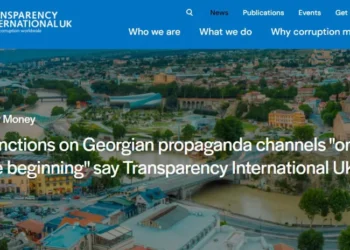Dorka Takácsy is a researcher who is pursuing her Ph.D. studies at the Corvinus University of Budapest, contemplating the broader topic of Russian domestic disinformation about the West. She is currently a Research Fellow at the Center for Euro-Atlantic Integration and Democracy (CEID), focusing on disinformation. Radio Free Europe/RL’s Georgian Service sat down with her to find out more about Hungary’s rogue president and what his latest moves might mean for Ukraine, Georgia and the EU as a whole.
What is President Orban’s modus operandi vis-à-vis the European Union these days? What’s the game he’s playing?
At the moment, what we see is that it’s in his interest to create a group of illiberal states and increase the number of illiberal states within the EU. Hungary is already in the EU, and now he’s very proudly promoting the accession process of many countries, including Georgia, for example, though, interestingly enough, not that of Ukraine. But the promotion of the increasingly illiberal Georgia’s accession process is a flagship project for him: he wants to create a makeshift alliance of like-minded countries.
Is he, as many claim, the Kremlin’s man in the EU? Or is he playing his own game?
Unfortunately, the two aren’t mutually exclusive. Blocking the 50 million Euro financial aid to Ukraine is, to date, the biggest favor he has done the Kremlin. He likes to talk about things, likes to make symbolic gestures towards Russia, but pleasing Moscow in such a way as this was until now absolutely unheard of. Of course, his deeds are very much praised by the Kremlin: basically, everything Orban is doing is handy for the Kremlin and helps it maintain its own domestic propaganda, where it tells its people: “Look, the EU is not unified – There is Hungary, there is Slovakia. The EU and the West collectively do not have a united strong stance against us.” So his deeds and his rhetoric have already been exploited by the Kremlin for a very long time. But to underpin it with an actual blocking of financial aid to Ukraine is taking it to a new level.

Ok, so he benefits the Kremlin, but what does he get in return?
That is the million-dollar question. The governmental rhetoric usually claims this relationship is beneficial for Hungary in terms of getting it cheap gas, but this is a myth. Hungary does not receive gas any cheaper than other regional countries that do not have friendly relations with the Kremlin. Even so, the rhetoric always refers to this. Most likely, it’s not the national interest, but the financial interests of the government and its close circles, because otherwise, this would not be logical- the cost of being in such a visibly close relationship with Russia is paid by the country and by the Hungarian people.
The cost of being in such a visibly close relationship with Russia is paid by the country and by the Hungarian people
Orban resisted until he got 10 billion euros unfrozen for Hungary and then, in a telling gesture, left the hall, clearly not there to protest opening the accession talks with Ukraine. However, he was very much present when the financial aid to Ukraine was being discussed, promptly blocking it 1 to 26. How far can the EU go when it comes to aiding Ukraine, with Orban popping up each time and demanding more money?
I see the risk of exactly this happening. Before the meeting, he and his government were talking about how Hungary is not going to link these two issues, Hungary’s frozen funds and the whole Ukraine issue. But already on Friday morning, Orban, in his customary radio interview that he does every week, was claiming exactly the opposite; that the beginning of the accession talks is merely a symbolic process, and over the years, throughout these negotiations, there will be multiple occasions when Hungary’s agreement is going to be needed, and that it will somehow hinder this process every single time, because, as he said, “Hungary needs to get all the money, not half and not quarter.” This is the textbook definition of blackmail. But as far as the Ukrainian financial aid package goes, since this was not vetoed, but blocked, it can eventually be circumvented by other countries, and they have already demonstrated their willingness to do so. But what Hungary did will definitely slow down the process for Ukraine, which is a big blow.
Let’s move from Ukraine to Georgia, which, as you said, is one of Orban’s flagship projects. Just how grateful should Georgia be to Orban for its getting EU candidate status? Did he play a role?
It’s a very good question, but if we look at the Hungarian government, we see it’s becoming increasingly isolated, and there are precious few countries willing to be in their camp. So, therefore, you see this lovely relationship with a fellow illiberal regime, big symbolic steps, for example, inviting PM Garibashvili as a keynote speaker at the Conservative Conference in Budapest, then paying him a familial visit to Georgia. And considering Orban isn’t really keen on foreign trips like these, especially this far, it’s a sign of personal favor. There are many other clicking interests, a very, very similar rhetoric, with what the Georgian Dream is doing in Georgia and Orban in Hungary – they are cheering illiberalism, they demonstrate, eventually, a despise towards the “decaying” West and a love of worshipping sovereignty, whether real or perceived. And they also have a really pronounced anti-Kyiv stance: neither government believes that Ukraine can win in this conflict. And, interestingly, each time Orban says Ukraine isn’t ready for EU membership, that it’s not democratic enough, and brings up its corruption and oligarchs, he conveniently ignores all similar criticism towards Georgia. And if the investigative journalists are right, then we can talk about the shipments from Hungary to Russia, and similar kinds of business being conducted in Georgia as well. So all this brings them rather close. But I would urge Georgia to be cautious when following Hungary, lest this puts the country’s EU aspirations under question as well. Hopefully, the Georgian leadership, if European integration is truly their objective, will be rational enough not to put all bets on Hungary as it becomes more and more isolated.
There will be multiple occasions when Hungary’s agreement is needed, and Orban threatens to hinder this process every single time
I’ve seen it theorized that Georgia should be seen as an instrument for Orban to drag down Ukraine’s EU progress – Each time Kyiv takes a step, Orban will pop up and veto it “unless Georgia is also given what it wants.” That creates additional headache in Brussels, where they might not be not be so eager to embrace Georgia as they are to embrace Ukraine. Is that a correct reading of the situation?
It might very well be. It does create leverage for him, for sure. I don’t really know what the probability of this scenario is, but it is one of the possible scenarios for sure.
What’s his end game? What’s the future that Orban is striving for?
Well, it’s difficult to predict. Even though he uses anti-EU rhetoric, I don’t think he would want to see Hungary outside the EU, at least not in the foreseeable future, because he knows that Hungary has weight and leverage only as long as it is in the EU. That’s his position of strength, that’s where he can bargain and derail the EU from. If Hungary leaves, it becomes much less significant and way less interesting, for example, for Chinese investors and investments, which Hungary’s foreign policy is somehow treating as the golden cow at the moment. As such, even though he is constantly criticizing the EU, he doesn’t want to leave it. And yet, he aspires for a weaker EU where he is given more leeway. And this is why he is constantly hoping for other more Euroskeptic partners, like Slovakia’s current government, so that the Euroskeptic group within the EU grows.
Tell us about Orban’s transformation from a pro-democracy, anti-Russian leader to the Orban we see today.
The transformation was really something remarkable, especially because when he entered into great politics, he became famous by holding a public speech about how the Russians should leave Hungary. This was at a time when the Russian tanks were still there. So his first step into politics definitely stands in harsh contrast with the current rhetoric. His party, Fidesz, has undergone a similar transformation. They had to spend eight years in opposition and they, so to say, learned their “lesson”. The chief impetus for this transformation towards illiberalism and anti-democracy is the desire to stay in power, for as long as possible. There is this rather telling quote of Orban’s, which he said when he lost back in 2002: “The homeland cannot be in the opposition.” I think this explains many things they have done since 2011, which basically includes state capture, media capture and so on.
Interview by Vazha Tavberidze














